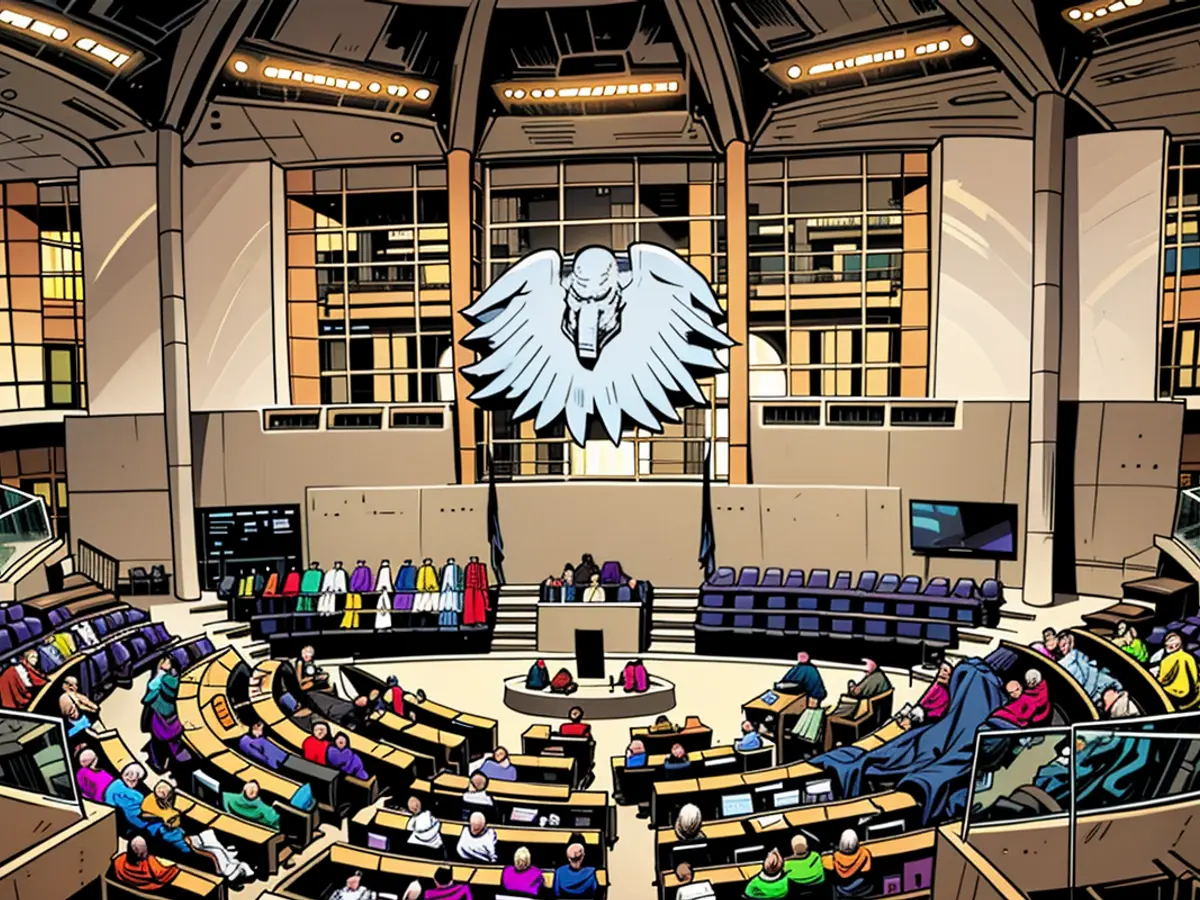- Is the new right to vote in the traffic light constitutional?
For over a year now, the reform of the Bundestag election law introduced by the traffic light coalition has been in effect. It is set to be applied for the first time in the upcoming federal election. However, it is currently under review at the Federal Constitutional Court, with the Union, Left, and the Bavarian state government challenging the new regulations.
Today, Germany's top judges will announce their verdict. Here are the key questions and answers:
Why was the election law changed?
The aim of the new regulation is to significantly reduce the size of the Bundestag. In 2020, the then grand coalition of CDU/CSU and SPD passed a electoral reform for this purpose, but it failed to achieve its intended effect. Mocked by its critics as a "mini-reform" from the start, it only managed to slow down the increase in the number of members. In the 2021 election, the Bundestag grew from 709 to 736 members, making it still the largest elected parliament in the world.**
How has the new reform changed the election law?
The new electoral law, decided by the SPD, Greens, and FDP in 2023, caps the number of seats at 630 parliamentarians. To achieve this, there will no longer be any overhang and equalization mandates. Overhang mandates occurred when a party won more direct mandates via first votes than it was entitled to based on its second vote result. These mandates could then be kept, with other parties receiving equalization mandates in return. The basic mandate clause is also set to be abolished. According to this clause, parties could still enter the Bundestag in proportion to their second vote results if they fell below the five percent hurdle but won at least three direct mandates.**
Who is opposing the reform - and why?
A total of 195 members of the Union faction in the Bundestag, the Bavarian state government, the Left parliamentary group, and the CSU and Left parties are challenging the law. More than 4,000 private individuals have also filed a constitutional complaint. According to the Federal Constitutional Court, the applicants and complainants feel that their rights to equal election laws under Article 38 of the Basic Law and the right to equal opportunities for parties under Article 21 of the Basic Law are particularly affected. Above all, much is at stake for the CSU and the Left.**
What's at stake for the CDU and CSU?
In the future, a party's number of seats in parliament will depend solely on its second vote result, even if it has won more direct mandates. This means that the winners of the constituencies with the worst first vote results would lose out. This would particularly affect the Union parties.**
In the 2021 federal election, the CSU won 45 direct mandates, 11 of which were overhang mandates that it would no longer receive under the new electoral law. The CDU won a further 12 overhang mandates in Baden-Württemberg. Together, this accounted for 23 out of a total of 34 overhang mandates, which in turn resulted in 104 equalization mandates.
The abolition of the basic mandate clause could also be particularly bitter for the CSU. If it were to slip below the five percent mark nationwide in the next election, it would be excluded from the Bundestag under the new electoral law, even if it were to win the majority of constituencies in Bavaria directly again. In the 2021 election, the CSU received 5.2 percent of the second votes nationwide.
Why is the verdict so important for the Left?
The Basic Mandate Clause, which is now set to be abolished, has already saved the Left twice. In the 2021 federal election, the party failed to clear the five percent hurdle and only entered the parliament with faction strength because it won three direct mandates. A similar scenario played out in 1994 for the predecessor party PDS. After the split of the Alliance for Progress and Social Justice (BSW), the Left is once again in deep crisis. In the European election at the beginning of June, it only managed to secure 2.7 percent.
This means that the Three-Mandate Clause would be a lifeline for the party if it were to remain in place. The outcome of the Karlsruhe ruling will also determine whether long-serving MP Gregor Gysi will run again in 2025 to defend his Berlin direct mandate. Initially, the 76-year-old lawyer will represent his party before the Constitutional Court.
Hadn't the court already ruled on the electoral law?
Yes, it did - in late November 2023, but that ruling referred to the previous reform of the electoral law. While the Second Senate approved it with regard to the by-election in Berlin, Chairwoman Doris König and two judges criticized the poor comprehensibility of the rules. In a so-called separate opinion, they stated that the voters were being asked to exercise their fundamental right to democratic self-determination "in the dark".
The Federal Constitutional Court is set to announce its verdict on the challenge against the FDP-led election law reform, which aims to cap the number of parliamentarians at 630 and abolish overhang and basic mandate clauses. If the new regulations are upheld, parties like the Union and the CSU could potentially lose benefits they currently have under the current system, including overhang mandates in the Bundestag.








